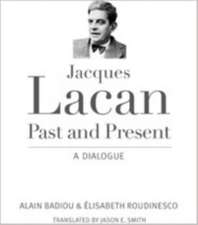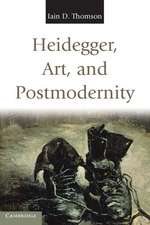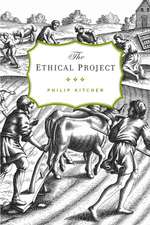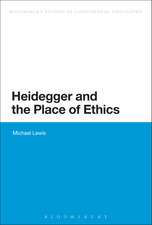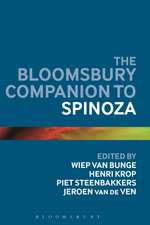Defending Rorty: Pragmatism and Liberal Virtue
Autor William M. Curtisen Limba Engleză Hardback – 13 aug 2015
Preț: 722.52 lei
Preț vechi: 840.14 lei
-14% Nou
Puncte Express: 1084
Preț estimativ în valută:
138.28€ • 143.81$ • 115.72£
138.28€ • 143.81$ • 115.72£
Carte tipărită la comandă
Livrare economică 15-29 martie
Preluare comenzi: 021 569.72.76
Specificații
ISBN-13: 9781107109858
ISBN-10: 110710985X
Pagini: 300
Dimensiuni: 160 x 235 x 25 mm
Greutate: 0.61 kg
Editura: Cambridge University Press
Colecția Cambridge University Press
Locul publicării:New York, United States
ISBN-10: 110710985X
Pagini: 300
Dimensiuni: 160 x 235 x 25 mm
Greutate: 0.61 kg
Editura: Cambridge University Press
Colecția Cambridge University Press
Locul publicării:New York, United States
Cuprins
Introduction: defending California: Richard Rorty's virtue liberalism; 1. Rorty's pragmatism: the critique of philosophy; 2. Rorty's pragmatic virtue liberalism; 3. Critics: from left to right; 4. Rorty vs Taylor: ontology, pluralism, and authoritarianism; 5. Rorty, religion, and pragmatic liberalism; 6. Rorty's liberal utopia and Huxley's pragmatist Island; 7. Conclusion.
Recenzii
'Depicting Richard Rorty as a neo-pragmatic 'virtue liberal', William M. Curtis provides us with the kind of defense that Rorty himself might have offered us had he been first and foremost a political theorist. Deeply grounded in the relevant literature, forcefully argued, and engagingly written, this book deserves the attention of all those interested in contemporary theories of democratic politics - whether or not they share the author's enthusiasm for Rorty's distinctive form of liberal utopianism.' Thomas Spragens, Duke University, North Carolina
'So much of the existing scholarship on Richard Rorty focuses on his critical project and so little focuses on the positive project; it's helpful to have so much space devoted, in William Curtis's book, to outlining a vision of Rorty's particular brand of liberalism.' Ari Kohen, Schlesinger Associate Professor of Political Science, University of Nebraska, Lincoln
'Defending Rorty provides a fresh and engaging perspective on how Richard Rorty's provocative ideas on culture and politics hang together. It breathes new life into long-standing debates on liberalism and its relationship to ethical concerns. Clearly written and sensitive to the issues at stake, the book will appeal to anyone interested in the possibility of a virtue-based conception of liberal democracy.' Alan Malachowski, University of Stellenbosch, South Africa
'William Curtis has written the most advanced account to date of Rorty as an ineluctably political and moral thinker. His re-description of a 'virtue liberal Rorty' establishes a novel interpretive frame with which subsequent writers must grapple. But Curtis does more than illuminate Rorty's thought in refreshing ways; this book is an astute statement of an ethically robust liberalism for today.' Christopher J. Voparil, Union Institute and University
'William Curtis offers a provocative rereading of Richard Rorty as a robust virtue liberal whose insights would evade the failings of a convictionless, and therefore possibly unconvincing, minimalist liberalism. This book develops a provocative reinterpretation of one of philosophy's most provocative figures: Rorty is here displayed not as an accommodating proponent of the proceduralism characteristic of recent political liberalisms but rather as a strong poet of liberal virtues. For Curtis, Rorty's work thus sustains an ongoing affirmation of political ideals of tolerance, respect, equality, and free self-governance.' Colin Koopman, University of Oregon
'Curtis' book opens up an important space for thinking about the possibilities for and of virtue liberalism, and also for thinking about Rorty qua political thinker.' Susan Dieleman, Contemporary Pragmatism
'So much of the existing scholarship on Richard Rorty focuses on his critical project and so little focuses on the positive project; it's helpful to have so much space devoted, in William Curtis's book, to outlining a vision of Rorty's particular brand of liberalism.' Ari Kohen, Schlesinger Associate Professor of Political Science, University of Nebraska, Lincoln
'Defending Rorty provides a fresh and engaging perspective on how Richard Rorty's provocative ideas on culture and politics hang together. It breathes new life into long-standing debates on liberalism and its relationship to ethical concerns. Clearly written and sensitive to the issues at stake, the book will appeal to anyone interested in the possibility of a virtue-based conception of liberal democracy.' Alan Malachowski, University of Stellenbosch, South Africa
'William Curtis has written the most advanced account to date of Rorty as an ineluctably political and moral thinker. His re-description of a 'virtue liberal Rorty' establishes a novel interpretive frame with which subsequent writers must grapple. But Curtis does more than illuminate Rorty's thought in refreshing ways; this book is an astute statement of an ethically robust liberalism for today.' Christopher J. Voparil, Union Institute and University
'William Curtis offers a provocative rereading of Richard Rorty as a robust virtue liberal whose insights would evade the failings of a convictionless, and therefore possibly unconvincing, minimalist liberalism. This book develops a provocative reinterpretation of one of philosophy's most provocative figures: Rorty is here displayed not as an accommodating proponent of the proceduralism characteristic of recent political liberalisms but rather as a strong poet of liberal virtues. For Curtis, Rorty's work thus sustains an ongoing affirmation of political ideals of tolerance, respect, equality, and free self-governance.' Colin Koopman, University of Oregon
'Curtis' book opens up an important space for thinking about the possibilities for and of virtue liberalism, and also for thinking about Rorty qua political thinker.' Susan Dieleman, Contemporary Pragmatism
Notă biografică
Descriere
Mixing American pragmatism and romanticism, Richard Rorty defends liberal democracy as an antiauthoritarian political regime based on liberal civic virtues.

